人教版选修8 unit 4 Pygmalion reading课件(47张ppt)
文档属性
| 名称 | 人教版选修8 unit 4 Pygmalion reading课件(47张ppt) |
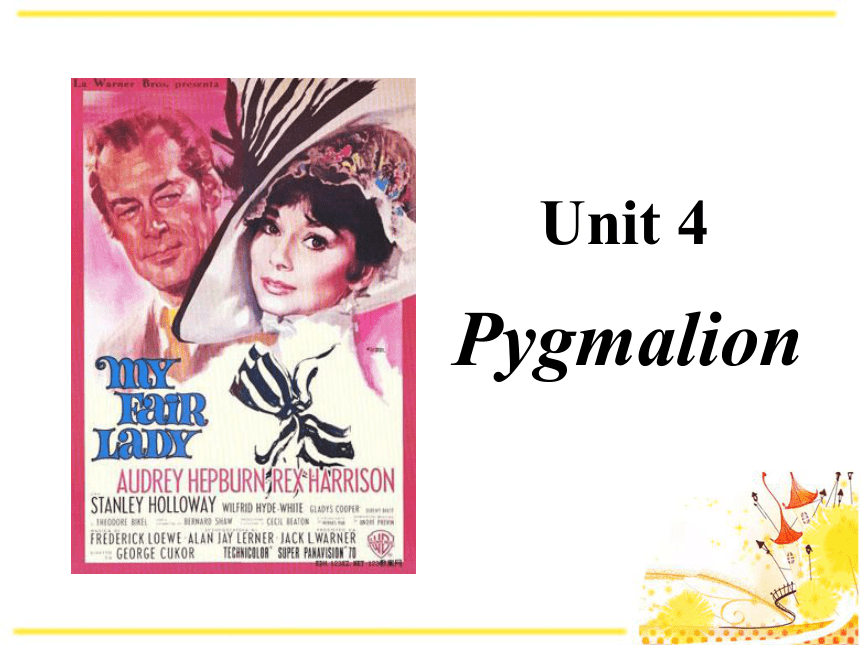
|
|
| 格式 | zip | ||
| 文件大小 | 1.7MB | ||
| 资源类型 | 教案 | ||
| 版本资源 | 人教版(新课程标准) | ||
| 科目 | 英语 | ||
| 更新时间 | 2019-06-10 00:00:00 | ||
图片预览

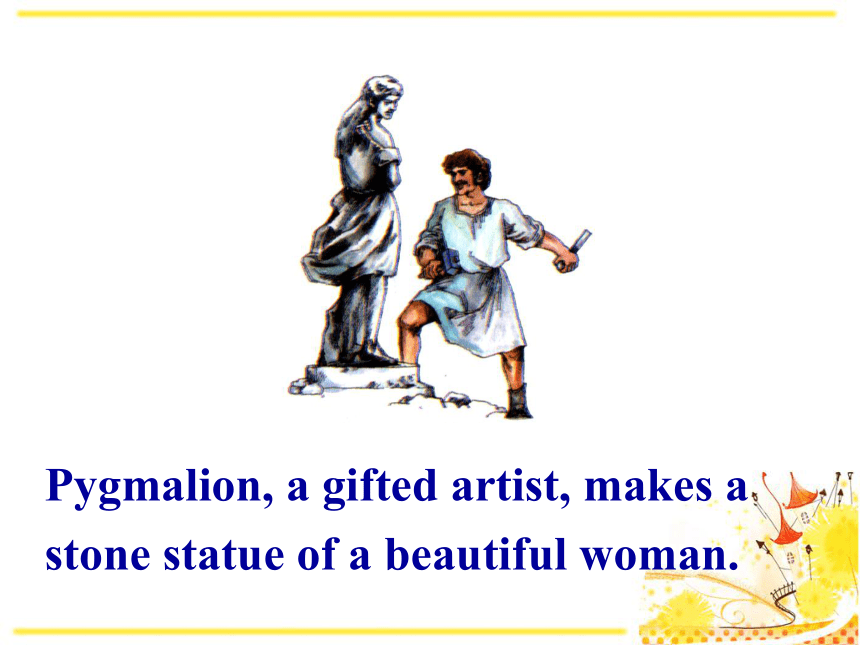
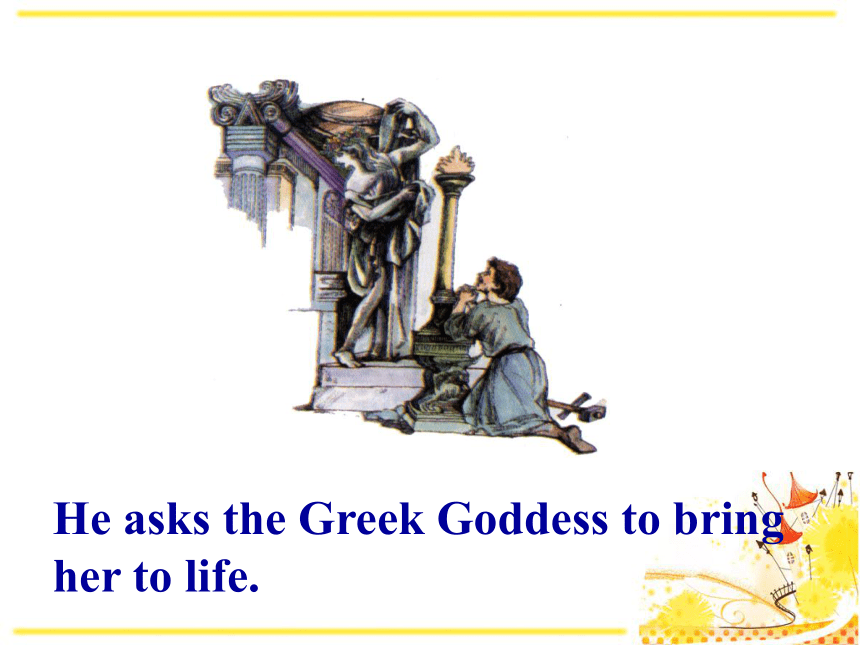
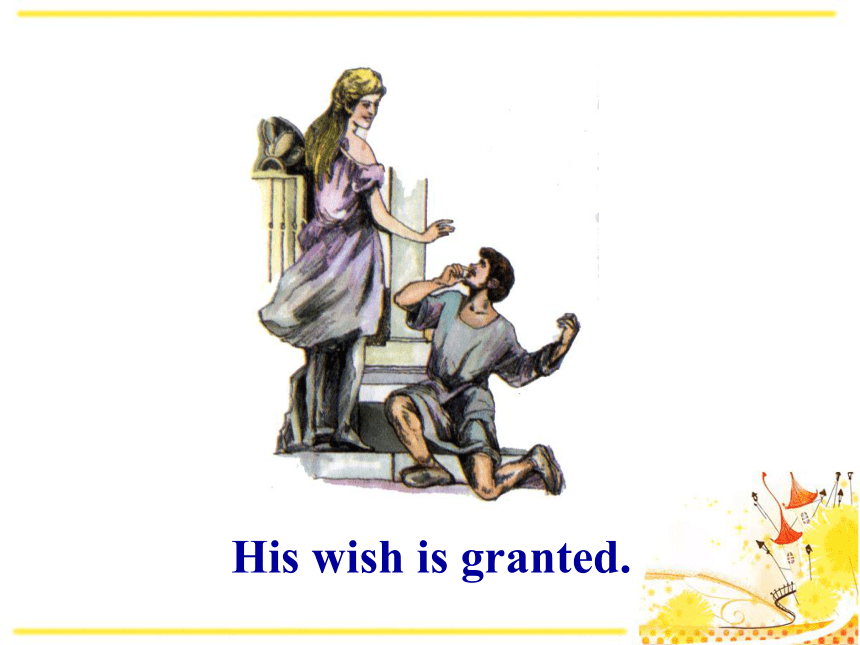
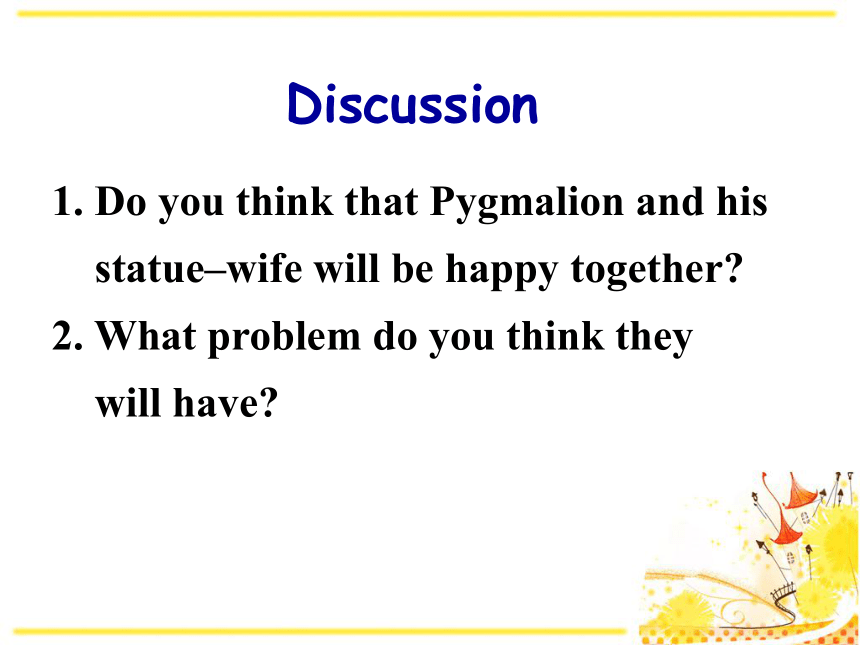
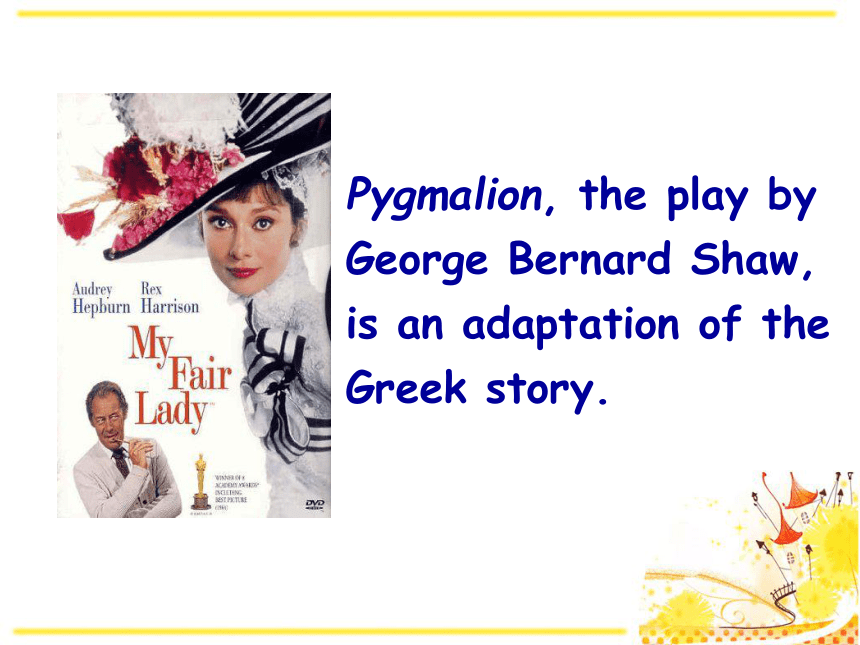
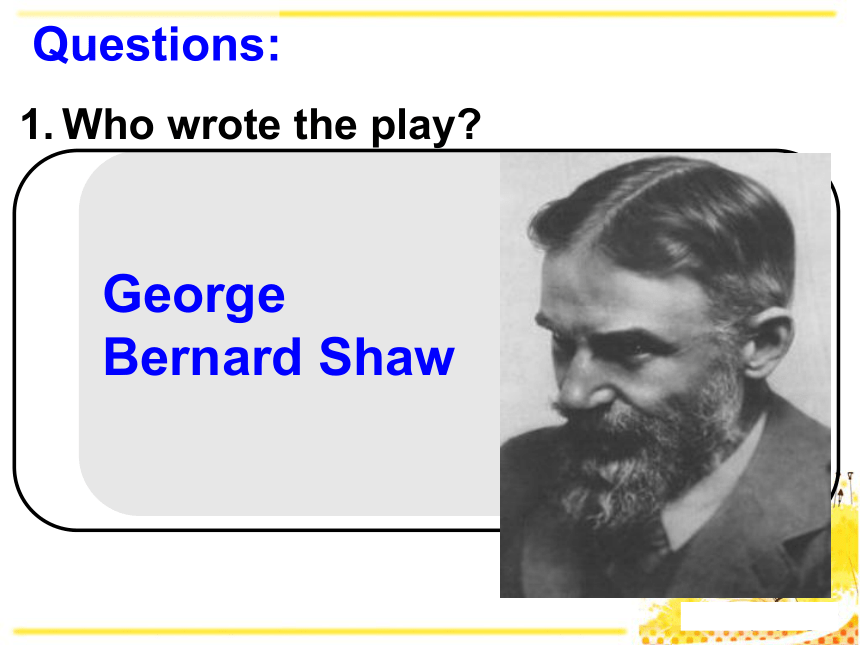
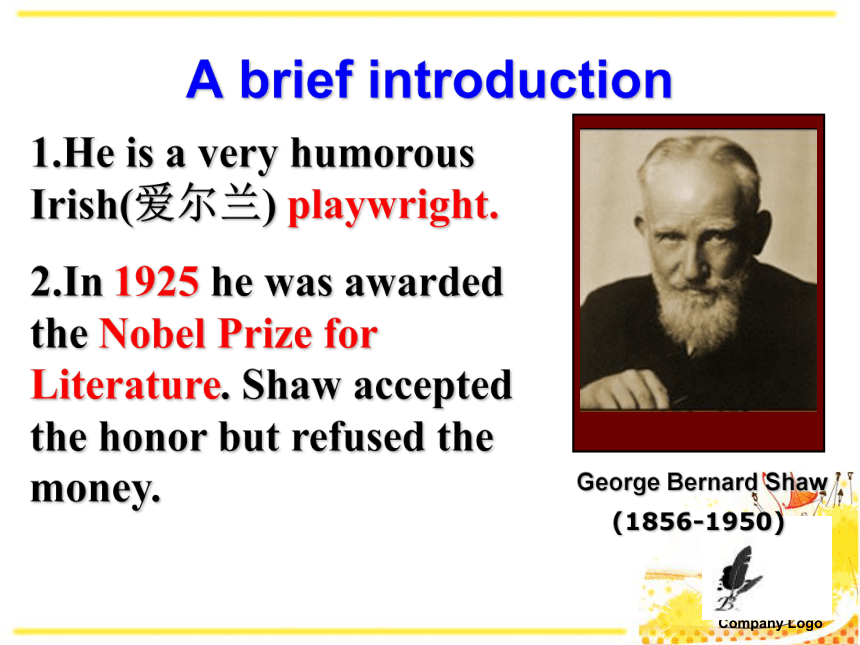
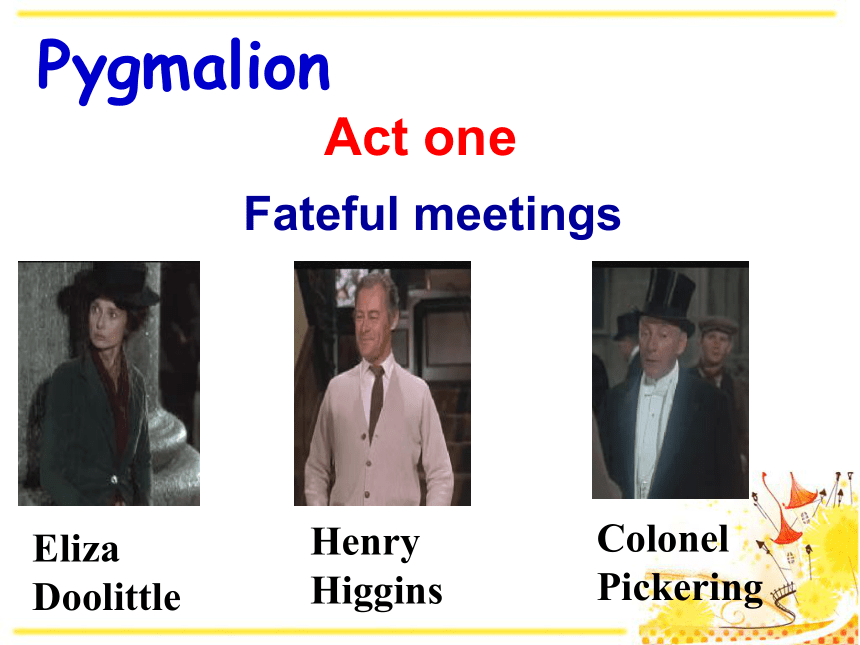
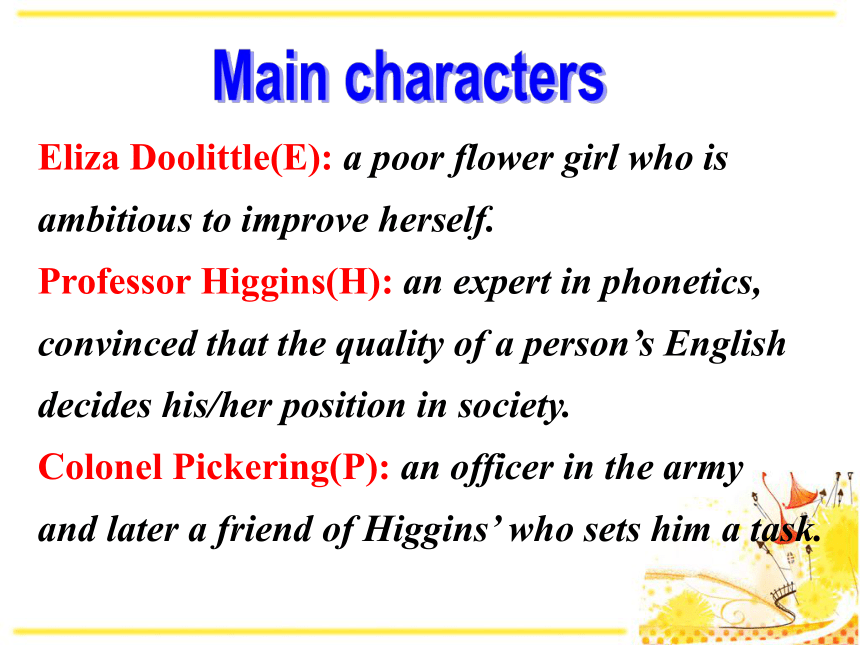
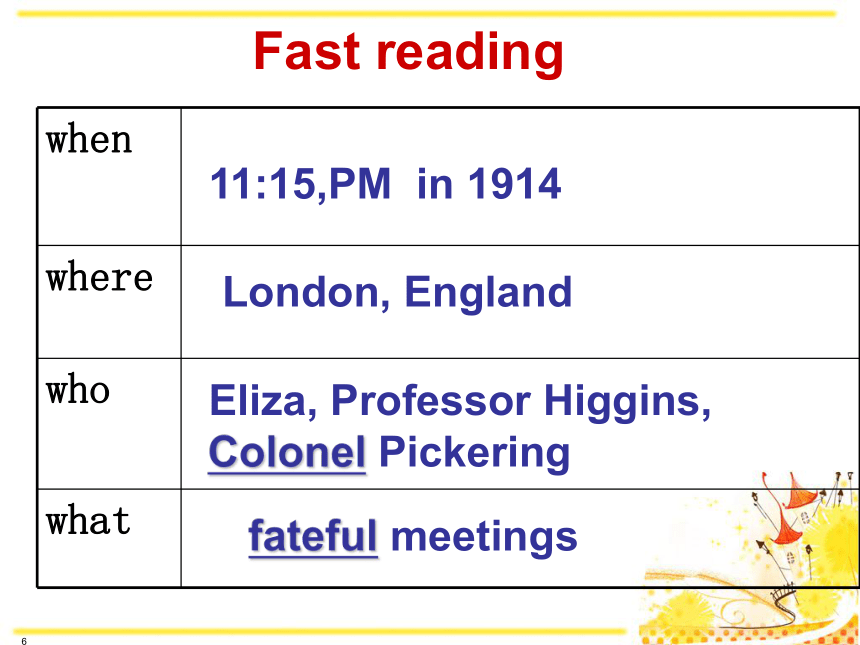
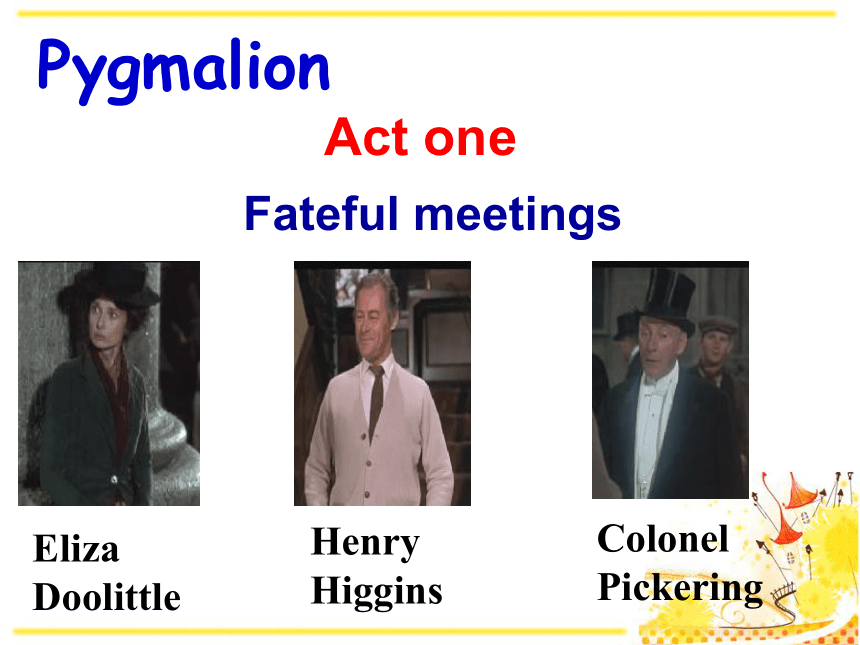
文档简介
Unit 4
Pygmalion
Pygmalion, a gifted artist, makes a
stone statue of a beautiful woman.
He asks the Greek Goddess to bring
her to life.
His wish is granted.
Discussion
Do you think that Pygmalion and his
statue–wife will be happy together?
2. What problem do you think they
will have?
Pygmalion, the play by George Bernard Shaw, is an adaptation of the Greek story.
Company Logo
Questions:
Who wrote the play?
George Bernard Shaw
Company Logo
A brief introduction
1.He is a very humorous Irish(爱尔兰) playwright.
2.In 1925 he was awarded the Nobel Prize for Literature. Shaw accepted the honor but refused the money.
George Bernard Shaw
(1856-1950)
Pygmalion
Act one
Fateful meetings
Eliza Doolittle
Henry
Higgins
Colonel
Pickering
Eliza Doolittle(E): a poor flower girl who is
ambitious to improve herself.
Professor Higgins(H): an expert in phonetics,
convinced that the quality of a person’s English
decides his/her position in society.
Colonel Pickering(P): an officer in the army
and later a friend of Higgins’ who sets him a task.
11:15,PM in 1914
London, England
Eliza, Professor Higgins, Colonel Pickering
fateful meetings
Fast reading
6
when
where
who
what
Pygmalion
Act one
Fateful meetings
Eliza Doolittle
Henry
Higgins
Colonel
Pickering
answer these questions.
Comprehending
1. Why is Eliza frightened of Higgins at first?
2. Where has Colonel Pickering been living
and what has he studied?
3. Who is Henry Higgins anxious to meet
and why?
4. What job does Eliza want to do? What does
she decide to do about it?
1. Why is Eliza frightened of him at first?
2. Where has Colonel Pickering been living
and what has he studied?
She thinks he is a policeman in disguise.
He has been living in India and has
studied many Indian dialects.
3. Who is Henry Higgins anxious to meet
and why?
He is anxious to meet Colonel Pickering
because he is working in the same
academic field as Pickering.
4. What job does Eliza want to do? What does she decide to do about it?
She wants to be a shop assistant and she decides
to learn better English from Higgins.
3. Can you recognize each character’s
social position by their behaviour and
language? Is he or she from the upper
class, middle class or lower class?
Give your reasons.
Lower class
Language: calls gentleman “sir” and _________ (or captain) which is a compliment
Behaviour: _________ to people of higher class
respectful
“cap’in”
Fill in the chart.
Character Position in society Evidence in the play
Eliza
Language: calls Eliza “___________” and Pickering “____________”
Behaviour: _____ to lower class; _____ to same or upper class
Middle class
rude
polite
you silly girl
my dear man
Character Position in society Evidence in the play
Henry Higgins
Upper class
Language: generous to______ by saying “that’s quite brilliant/ Extraordinary”.
Behaviour: generally confident and ______
polite
praise
Character Position in society Evidence in the play
Colonel Pickering
Choose those adjectives in the list which
best describe each character in the play.
In pairs discuss them and then place them
in the boxes below. Some can be used more
than once.
impatient kind polite rude confident
anxious eager enthusiastic motional
self-important ambitious generous
unsure superior dynamic
kind, polite, generous,
enthusiastic, eager, confident
impatient, rude, confident,
superior, self-important
anxious, eager, emotional,
ambitious, unsure, dynamic
5 Suppose you have a chance to help
Eliza improve her use of the English
language. Correct all these sentences
in terms of grammar, spelling, etc, so
that she can use them properly.
1. Come over’ere, cap’in, and buy me flowers
off a poor girl.
Come over here, captain, and buy some
flowers from a poor girl.
2. I ain’t done nothing wrong by speaking to
that gentleman.
I haven’t done anything wrong by
speaking to that gentleman.
I thought maybe you were a policeman in disguise.
4. How do I know whether’ ou took me down right?
How do I know whether you took me down
accurately?
5. A shop assistant? Now that’s sommat I want,
that is!
A shop assistant? Now that’s something I want!
3. I thought maybe you was a policeman in disguise.
Professor Higgins (H): an expert in phonetics,
convinced that the quality of a person’s English
decides his/her position in society.
1) convince sb to do sth说服…去
我们说服了他坐火车去, 不要搭飞机去。
We convinced him to go by train rather plane.
2) convince sb + of sth/that 从句 “使…确信…”
3) be convinced + of sth/ that 从句 “坚信…”
我确信他是清白的。
I am convinced of his innocence.
=I am convinced that he was innocent.
我不认为她的强颜欢笑能使她父亲相信她过得很开心。
I don’t think her forced smile
________________________________________
will convince her father that she lives happily.
2. While watching, he makes notes.
他一边观察, 一边做笔记。
▲ while watching 为while he is watching 省略句。
1) When_____ help, one often says “Thank you.”
or “It’s kind of you.”
A. offering B. to offer
C. to be offered D. offered
2) While______ the river, he saw a big crocodile.
A. to cross B. crossing C. cross D. crossed
3) --What’s the matter with you?
--_____ the window, my finger was cut.
A. Cleaning B. To clean
C. While cleaning D. While I was cleaning
D
B
D
3. hesitate v. 犹豫, 踌躇
hesitate to do sth. 对做某事犹豫不决
hesitate about (doing) sth. 对做某事犹豫不决
I always hesitate _____ advising my friends
on what to read.
A. with B. to C. for D. about
If you have any questions, don’t hesitate ____
me.
A. ask B. asked C. to ask D. asking
D
C
4. I ain’t done nothing wrong by speaking to
that gentleman.
▲ ain’t 是不规范的语言, 相当于am not,
is not, has not, have not。
① We ain’t coming. 我们不来了。
② They ain’t got it. 他们没有那玩意儿。
5. in disguise 意为“乔装”
这位皇帝喜欢微服私访。
The emperor liked travelling in disguise.
6. But they betray themselves every time they
open their mouths.
betray oneself 无意中露出本性; 背叛
相当多的人面对金钱的诱惑便原形毕露。
_____________________________________
when they are tempted by money.
Quite a lot of people will betray themselves
betray 1) vt. give away 泄露(秘密)
他向所有的朋友透露了这个消息。
__________________________________
He betrayed the news to all his friends.
2) vt. to be disloyal or unfaithful to 出卖; 背叛
他的最好的朋友背叛了他。
___________________________
His best friend betrayed him.
他背叛祖国,向敌人投降了。
_________________________________.
He betrayed his country to the enemy
7. The English that will condemn her to the
gutter to the end of her days.
condemn vt.判刑,谴责,使…注定
condemn sb./sth for sth.因为…指责...
她知道社会将会谴责她遗弃孩子.
She knew that society would condemn her for deserting her child.
condemn sb to sth.判某人…刑罚,使…注定
The judge condemned the criminal to death.
His bad leg condemned him to a wheelchair.
我很久以前已经认识他了。
我懂得这门语言。
8. acquaintance n. 相识; 了解 acquaint vt.
I have some acquaintance with the language.
I made his acquaintance long ago.
make one’s acquaintance /
make the acquaintance of sb.
结识某人
have some/little acquaintance with…
(不)了解
have a nodding acquaintance with sb.
与某人为点头之交
The musician had little acquaintance
_____ modern science.
A. in B. with C. to D. of
I am delighted to _____ your acquaintance.
A. pull B. take C. have D. make
B
D
18. a fortune! 一笔财富
[U] success; good luck 成功; 好运, 幸运
Fortune smiled on him. 他事事顺利.
By good fortune he was not hurt.
2) [C] 未来的命运; 运道; 运气
What will be our fortune?
One day good fortune befell him.
3) [C] 财富
He received a large fortune when his father died.
fortunate adj. 幸运的 fortunately adv. 幸运地
make a fortune 发财 seek one’s fortune 外出找出路
try one’s fortune 碰运气
be fortunate to do sth./ in doing sth. 幸运地做某事
19. Generally speaking, people are more polite to
those whom they think are of higher social class.
总的来说, 人们对那些他们认为属于较高社会阶层
的人更礼貌一些。
1) 本句中的of 表示”从属”关系。
物以类聚, 人以群分。Birds of a feather flock together.
2) be of + 形容词+抽象名词=be +副词+与该抽象
名词同根的形容词。如: 我所说的非常重要。
What I said is of great importance.
= What I said is very important.
可用于以上结构的抽象名词及相对应的
形容词有: ability--able, help--helpful,
importance--important, interest--interesting,
significance--significant, use--useful,
value--valuable.
20. superior 作为形容词有两大用法:
1) 作为普通形容词, 意为“傲慢的”。例如:
我讨厌他那傲慢的态度。
I hate his superior manner.
2) 作为暗含比较级的形容词, 意为“较高级”、
“较好的”、“较…为优秀的”。
由于superior本身隐含着比较意义, 因此不能
在前面再加more。在与另一事物进行比较时,
与之搭配的介词要用to, 不能than。如:
约翰逊的数学比王先生好。
Johnson is superior to Mr. Wang in mathematics.
与superior用法相同的词还有inferior,
senior, junior, prior等。
比…优越, 不屈服于 be superior to
低于 be inferior to
比…年长 be senior to
比…年轻 be junior to
如: 青铜不如金子。Brass is inferior to gold.
他比我小很多岁。
He is junior to me by many years.
我母亲在结婚前曾经是电工。
Prior to her marriage, my mother was an
electrician.
21. in terms of 就……来说, 从……角度
In terms of natural resources it is one of the
poorest countries in Western Europe.
In terms of money we’re quite rich, but not in
terms of happiness.
就安置房子你做了什么?
What have you done in terms of fixing the house?
in the long/ short term
从长期/短期而言
be ambitious to
convince sb. of sth./that/to do sth.
decide
set sb. a task
hide from the rain
shelter from the rain
make notes /take notes
hold up
better than nothing
雄心勃勃的
使确信
决定/影响
安排某人任务
躲雨
作笔记
举起
比没有好
Phrases
in disguise
hand over
push sth back
if I’m not mistaken
what if
every time
end in
betray sb/sth/oneself
dismissively
9. 假装, 装扮
10. 移交
11. 推迟延迟
12. 如果我没有搞错的话
13. 要是…又会怎样
14. 每次
15. 以…为结尾
16. 背叛, 泄露
17. 轻蔑地
condemn sb. to sth.
the gutter
to the end of her days
find employment
make one’s acquaintance
a handful of
in amazement
deep in conversation
fancy oneself
18. 迫使接受困境
19. 社会底层贫民窟
20. 余生
21. 找工作
22. 结识
23. 一把
24. 惊谔地
25. 专心谈话
26. 自负自命不凡
quite a common kind of
badly dressed
ask sb. a favour
treat sb. like dirt
have the face to do
the other day
take away
pass sb. off as
go off stage
fade out
27.相当普通的一种
28.穿着很差
29.请求帮忙
30.视…如粪土蔑视
31.恬不知耻做…
32.几天前
33.带走, 外卖
34.冒充
35.退下舞台
36.逐渐模糊
Homework
Review the text. Try to act out the play.
Write a short passage to introduce the
story briefly.
3. Find out some difficult words and
expressions in the play.
Pygmalion
Pygmalion, a gifted artist, makes a
stone statue of a beautiful woman.
He asks the Greek Goddess to bring
her to life.
His wish is granted.
Discussion
Do you think that Pygmalion and his
statue–wife will be happy together?
2. What problem do you think they
will have?
Pygmalion, the play by George Bernard Shaw, is an adaptation of the Greek story.
Company Logo
Questions:
Who wrote the play?
George Bernard Shaw
Company Logo
A brief introduction
1.He is a very humorous Irish(爱尔兰) playwright.
2.In 1925 he was awarded the Nobel Prize for Literature. Shaw accepted the honor but refused the money.
George Bernard Shaw
(1856-1950)
Pygmalion
Act one
Fateful meetings
Eliza Doolittle
Henry
Higgins
Colonel
Pickering
Eliza Doolittle(E): a poor flower girl who is
ambitious to improve herself.
Professor Higgins(H): an expert in phonetics,
convinced that the quality of a person’s English
decides his/her position in society.
Colonel Pickering(P): an officer in the army
and later a friend of Higgins’ who sets him a task.
11:15,PM in 1914
London, England
Eliza, Professor Higgins, Colonel Pickering
fateful meetings
Fast reading
6
when
where
who
what
Pygmalion
Act one
Fateful meetings
Eliza Doolittle
Henry
Higgins
Colonel
Pickering
answer these questions.
Comprehending
1. Why is Eliza frightened of Higgins at first?
2. Where has Colonel Pickering been living
and what has he studied?
3. Who is Henry Higgins anxious to meet
and why?
4. What job does Eliza want to do? What does
she decide to do about it?
1. Why is Eliza frightened of him at first?
2. Where has Colonel Pickering been living
and what has he studied?
She thinks he is a policeman in disguise.
He has been living in India and has
studied many Indian dialects.
3. Who is Henry Higgins anxious to meet
and why?
He is anxious to meet Colonel Pickering
because he is working in the same
academic field as Pickering.
4. What job does Eliza want to do? What does she decide to do about it?
She wants to be a shop assistant and she decides
to learn better English from Higgins.
3. Can you recognize each character’s
social position by their behaviour and
language? Is he or she from the upper
class, middle class or lower class?
Give your reasons.
Lower class
Language: calls gentleman “sir” and _________ (or captain) which is a compliment
Behaviour: _________ to people of higher class
respectful
“cap’in”
Fill in the chart.
Character Position in society Evidence in the play
Eliza
Language: calls Eliza “___________” and Pickering “____________”
Behaviour: _____ to lower class; _____ to same or upper class
Middle class
rude
polite
you silly girl
my dear man
Character Position in society Evidence in the play
Henry Higgins
Upper class
Language: generous to______ by saying “that’s quite brilliant/ Extraordinary”.
Behaviour: generally confident and ______
polite
praise
Character Position in society Evidence in the play
Colonel Pickering
Choose those adjectives in the list which
best describe each character in the play.
In pairs discuss them and then place them
in the boxes below. Some can be used more
than once.
impatient kind polite rude confident
anxious eager enthusiastic motional
self-important ambitious generous
unsure superior dynamic
kind, polite, generous,
enthusiastic, eager, confident
impatient, rude, confident,
superior, self-important
anxious, eager, emotional,
ambitious, unsure, dynamic
5 Suppose you have a chance to help
Eliza improve her use of the English
language. Correct all these sentences
in terms of grammar, spelling, etc, so
that she can use them properly.
1. Come over’ere, cap’in, and buy me flowers
off a poor girl.
Come over here, captain, and buy some
flowers from a poor girl.
2. I ain’t done nothing wrong by speaking to
that gentleman.
I haven’t done anything wrong by
speaking to that gentleman.
I thought maybe you were a policeman in disguise.
4. How do I know whether’ ou took me down right?
How do I know whether you took me down
accurately?
5. A shop assistant? Now that’s sommat I want,
that is!
A shop assistant? Now that’s something I want!
3. I thought maybe you was a policeman in disguise.
Professor Higgins (H): an expert in phonetics,
convinced that the quality of a person’s English
decides his/her position in society.
1) convince sb to do sth说服…去
我们说服了他坐火车去, 不要搭飞机去。
We convinced him to go by train rather plane.
2) convince sb + of sth/that 从句 “使…确信…”
3) be convinced + of sth/ that 从句 “坚信…”
我确信他是清白的。
I am convinced of his innocence.
=I am convinced that he was innocent.
我不认为她的强颜欢笑能使她父亲相信她过得很开心。
I don’t think her forced smile
________________________________________
will convince her father that she lives happily.
2. While watching, he makes notes.
他一边观察, 一边做笔记。
▲ while watching 为while he is watching 省略句。
1) When_____ help, one often says “Thank you.”
or “It’s kind of you.”
A. offering B. to offer
C. to be offered D. offered
2) While______ the river, he saw a big crocodile.
A. to cross B. crossing C. cross D. crossed
3) --What’s the matter with you?
--_____ the window, my finger was cut.
A. Cleaning B. To clean
C. While cleaning D. While I was cleaning
D
B
D
3. hesitate v. 犹豫, 踌躇
hesitate to do sth. 对做某事犹豫不决
hesitate about (doing) sth. 对做某事犹豫不决
I always hesitate _____ advising my friends
on what to read.
A. with B. to C. for D. about
If you have any questions, don’t hesitate ____
me.
A. ask B. asked C. to ask D. asking
D
C
4. I ain’t done nothing wrong by speaking to
that gentleman.
▲ ain’t 是不规范的语言, 相当于am not,
is not, has not, have not。
① We ain’t coming. 我们不来了。
② They ain’t got it. 他们没有那玩意儿。
5. in disguise 意为“乔装”
这位皇帝喜欢微服私访。
The emperor liked travelling in disguise.
6. But they betray themselves every time they
open their mouths.
betray oneself 无意中露出本性; 背叛
相当多的人面对金钱的诱惑便原形毕露。
_____________________________________
when they are tempted by money.
Quite a lot of people will betray themselves
betray 1) vt. give away 泄露(秘密)
他向所有的朋友透露了这个消息。
__________________________________
He betrayed the news to all his friends.
2) vt. to be disloyal or unfaithful to 出卖; 背叛
他的最好的朋友背叛了他。
___________________________
His best friend betrayed him.
他背叛祖国,向敌人投降了。
_________________________________.
He betrayed his country to the enemy
7. The English that will condemn her to the
gutter to the end of her days.
condemn vt.判刑,谴责,使…注定
condemn sb./sth for sth.因为…指责...
她知道社会将会谴责她遗弃孩子.
She knew that society would condemn her for deserting her child.
condemn sb to sth.判某人…刑罚,使…注定
The judge condemned the criminal to death.
His bad leg condemned him to a wheelchair.
我很久以前已经认识他了。
我懂得这门语言。
8. acquaintance n. 相识; 了解 acquaint vt.
I have some acquaintance with the language.
I made his acquaintance long ago.
make one’s acquaintance /
make the acquaintance of sb.
结识某人
have some/little acquaintance with…
(不)了解
have a nodding acquaintance with sb.
与某人为点头之交
The musician had little acquaintance
_____ modern science.
A. in B. with C. to D. of
I am delighted to _____ your acquaintance.
A. pull B. take C. have D. make
B
D
18. a fortune! 一笔财富
[U] success; good luck 成功; 好运, 幸运
Fortune smiled on him. 他事事顺利.
By good fortune he was not hurt.
2) [C] 未来的命运; 运道; 运气
What will be our fortune?
One day good fortune befell him.
3) [C] 财富
He received a large fortune when his father died.
fortunate adj. 幸运的 fortunately adv. 幸运地
make a fortune 发财 seek one’s fortune 外出找出路
try one’s fortune 碰运气
be fortunate to do sth./ in doing sth. 幸运地做某事
19. Generally speaking, people are more polite to
those whom they think are of higher social class.
总的来说, 人们对那些他们认为属于较高社会阶层
的人更礼貌一些。
1) 本句中的of 表示”从属”关系。
物以类聚, 人以群分。Birds of a feather flock together.
2) be of + 形容词+抽象名词=be +副词+与该抽象
名词同根的形容词。如: 我所说的非常重要。
What I said is of great importance.
= What I said is very important.
可用于以上结构的抽象名词及相对应的
形容词有: ability--able, help--helpful,
importance--important, interest--interesting,
significance--significant, use--useful,
value--valuable.
20. superior 作为形容词有两大用法:
1) 作为普通形容词, 意为“傲慢的”。例如:
我讨厌他那傲慢的态度。
I hate his superior manner.
2) 作为暗含比较级的形容词, 意为“较高级”、
“较好的”、“较…为优秀的”。
由于superior本身隐含着比较意义, 因此不能
在前面再加more。在与另一事物进行比较时,
与之搭配的介词要用to, 不能than。如:
约翰逊的数学比王先生好。
Johnson is superior to Mr. Wang in mathematics.
与superior用法相同的词还有inferior,
senior, junior, prior等。
比…优越, 不屈服于 be superior to
低于 be inferior to
比…年长 be senior to
比…年轻 be junior to
如: 青铜不如金子。Brass is inferior to gold.
他比我小很多岁。
He is junior to me by many years.
我母亲在结婚前曾经是电工。
Prior to her marriage, my mother was an
electrician.
21. in terms of 就……来说, 从……角度
In terms of natural resources it is one of the
poorest countries in Western Europe.
In terms of money we’re quite rich, but not in
terms of happiness.
就安置房子你做了什么?
What have you done in terms of fixing the house?
in the long/ short term
从长期/短期而言
be ambitious to
convince sb. of sth./that/to do sth.
decide
set sb. a task
hide from the rain
shelter from the rain
make notes /take notes
hold up
better than nothing
雄心勃勃的
使确信
决定/影响
安排某人任务
躲雨
作笔记
举起
比没有好
Phrases
in disguise
hand over
push sth back
if I’m not mistaken
what if
every time
end in
betray sb/sth/oneself
dismissively
9. 假装, 装扮
10. 移交
11. 推迟延迟
12. 如果我没有搞错的话
13. 要是…又会怎样
14. 每次
15. 以…为结尾
16. 背叛, 泄露
17. 轻蔑地
condemn sb. to sth.
the gutter
to the end of her days
find employment
make one’s acquaintance
a handful of
in amazement
deep in conversation
fancy oneself
18. 迫使接受困境
19. 社会底层贫民窟
20. 余生
21. 找工作
22. 结识
23. 一把
24. 惊谔地
25. 专心谈话
26. 自负自命不凡
quite a common kind of
badly dressed
ask sb. a favour
treat sb. like dirt
have the face to do
the other day
take away
pass sb. off as
go off stage
fade out
27.相当普通的一种
28.穿着很差
29.请求帮忙
30.视…如粪土蔑视
31.恬不知耻做…
32.几天前
33.带走, 外卖
34.冒充
35.退下舞台
36.逐渐模糊
Homework
Review the text. Try to act out the play.
Write a short passage to introduce the
story briefly.
3. Find out some difficult words and
expressions in the play.
